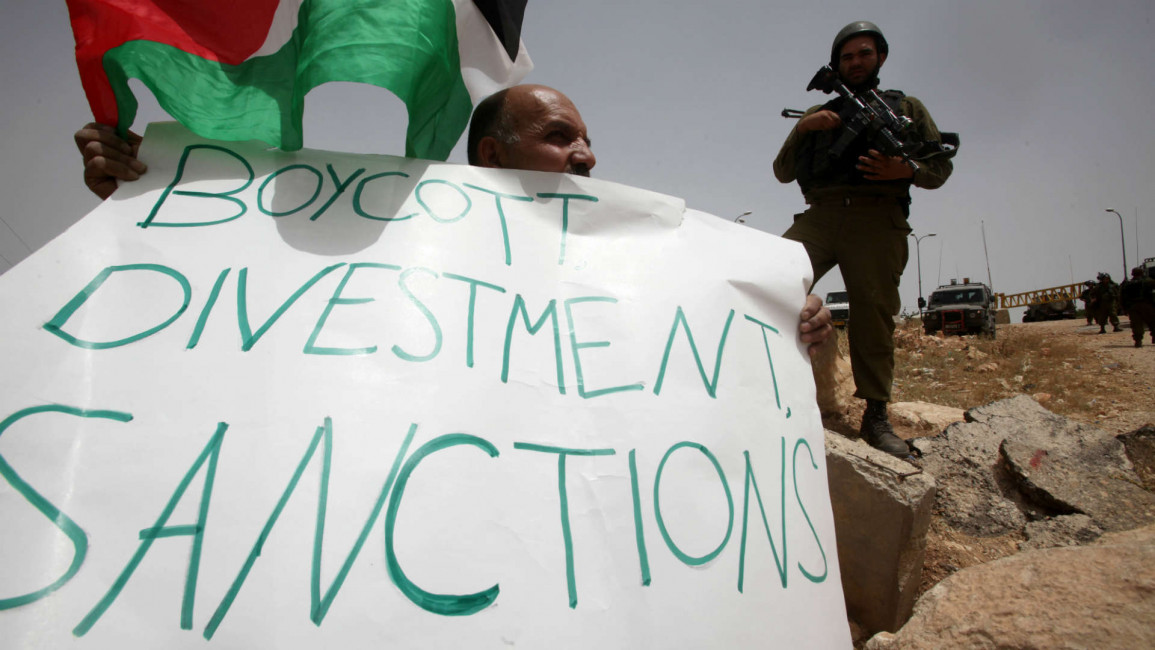
BDS: A movement, vindicated
The recent mobilisations in solidarity with Palestine following Israel's recent attacks on Gaza, the expulsions in Sheikh Jarrah, and violence in the Al-Aqsa mosque have seemingly led to a significant turning point in global solidarity efforts with the Palestinian people, and their struggle for liberation and return.
In addition to the hundreds of protests that have taken place around the world in the last few weeks, the call to Boycott, Divest and Sanction (BDS) Israel (and those entities that profit from Israeli apartheid) in protest of its continued violations of international law, is intensifying.
The BDS campaign, led by 170 civil society groups including unions, refugee networks and women's organisations, was launched in 2005 as a means to apply international pressure on the Israeli state. Today, activists often compare this tactic to the successful boycott campaign of the South African anti-apartheid struggle.
Indeed, nearly 30 years of a global boycott of South-African goods, and cultural ties - including sports and music - as well as international financial sanctions and divestment from South African companies, all had a detrimental impact on the apartheid regime. It increased the pressure on defenders of apartheid and expanded the political space for the South African liberation struggle, which eventually achieved its liberation and the fall of the settler state.
"It increased the pressure on defenders of apartheid and expanded the political space for the South African liberation struggle"
Today, it's Palestinians who are calling on the international community to apply the same pressure, this time on Israel's apartheid. For its part, Israel has gone to great lengths to deny the historical association between black South Africans at the hands of white settlers, and the oppression of Palestinians by Jewish settlers.
However, in April Human Rights Watch published a landmark report that accused Israel of "crimes of apartheid". B'Tselem also released a report on Israel's apartheid practices. In doing so, both organisations joined the countless Palestinian and South African activists, groups, and organisations who have been making this exact point for decades.
Indeed, regardless of Israel's attempts to whitewash its actions, South African anti-apartheid voices have long emphasised the similarities between the systematic oppression of both indigenous populations at the hands of settler supremacists. In fact, South Africa has maintained formal diplomatic ties since 1995 with the Palestinian Authority - soon after the end of apartheid - and officially recognises Palestine as a sovereign state.
South African president Cyril Ramaphosa, who was formally active in the struggle against apartheid, reinforced the relationship between the two nations when he expressed his support to Palestinians during Israel's latest onslaught. "As lovers of freedom and of justice, we stand with the Palestinian people in their quest for self-determination, but also in their resistance against the deprivation of their human rights and the denial of their dignity,'' he stated.
A ship from apartheid-Israeli shipping co, Zim Tarragona scheduled to dock in the @PortNYNJ on Sunday, June 6th. We're going to #BlocktheBoat to #ShutdownApartheid as part of #BDS & International Week of Action by @AROCBayArea. Text your name to 833-320-1973 for TBD time/location pic.twitter.com/BlAnr8ZtDm
— NY4Palestine (@Ny4Palestine) May 31, 2021
While Ramaphosa's professed love for freedom and justice has been called into question since coming to power, the solidarity between the two peoples and the link between their struggles is undeniable, as represented by Desmond Tutu's long-standing advocacy for Palestinian liberation and the formal ties between the PLO and the ANC during decades of struggle.
The fact that the African nation serves as a success story, despite a similar imbalance of power supported by powerful countries like Britain and the US, is a worry for the Israeli state.
"The fact that the African nation serves as a success story is a worry for the Israeli state"
Indeed, internationally anger over Israel's crimes is intensifying. Mass protests were organised from North to South Africa. In Morocco, despite recent normalisation agreements with Israel, demonstrators sent a loud message by protesting in 46 different towns and cities. In Kenya, hundreds took to the streets of Nairobi despite facing aggressive police repression. In Yemen and Baghdad, thousands turned out, while in London, New York, and Paris, huge crowds protested - sometimes despite government bans - to demand an end to the complicity of their regimes with Israel's apartheid regime.
In the UK, Action Palestine activists even occupied Elbit weapons factories to stop the continued arming of Israel, while Italian dockers refused to handle weapons being transported to Israel. Even in US politics, which has historically been staunchly pro-Israel, lawmakers are tabling a motion to block a new sale of US weaponry to Israel by the Biden administration.
A liberating wind is blowing across the globe, underscoring once more that while our states and governments might cosy up to Israel, normalise its crimes, and participate in its colonial oppression, people around the world continue to stand with Palestinians.
"Governments in the West have repeatedly tried to silence the Palestine solidarity movement by passing laws criminalising BDS"
This is all the more remarkable because governments in the West have repeatedly tried to silence the Palestine solidarity movement by passing laws criminalising BDS, conflating anti-Zionism and anti-Semitism, and normalising the targeting of pro-Palestine activism. While their tactics might have imposed short term fear and silence, it has neither convinced nor won over the vast majority.
The question now is how to build on these impressive demonstrations of solidarity and develop the kind of material pressure on Israel that can cripple the apartheid regime. There is no doubt that Palestinians, alongside the people of the MENA region, will liberate themselves. But our solidarity can facilitate their struggle for liberation and return.
Now is the time to pass BDS motions in workplaces, unions, universities, community campaigns, local governments and institutions. But it is also the time to turn those motions into realities by campaigning, demonstrating, signing petitions, striking and occupying, until those bodies cut all material, economic, military, diplomatic, academic, and cultural ties with Israel, Israeli institutions, and all those who profit from Israeli apartheid.
The bombs may have stopped falling, but Israeli colonialism advances apace. The time for action is now.
Malia Bouattia is an activist, a former president of the National Union of Students, and co-founder of the Students not Suspects/Educators not Informants Network.
Follow her on Twitter: @MaliaBouattia
Have questions or comments? Email us at: editorial-english@alaraby.co.uk
Opinions expressed here are the author's own and do not necessarily reflect those of her employer, or The New Arab and its editorial board or staff.




